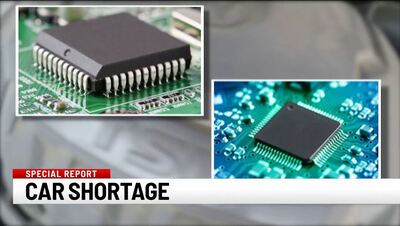Reduced New Car Inventory? So How Did Virtually Every Car Maker Hit Record US Sales In June 2021 If A Chip Shortage Really Reduced Inventory?
Auto Central Louisville, July 1, 2021; The June US retail auto sales results are in, virtually every car maker (Including RV's) today announced record or near record sales, because the Wuhan Virus facilitated a pent-up demand and Trump's vaccines released that demand as a perfect storm for sellers.
.Auto dealers are making more profit and their dealerships are fetching higher selling prices than ever before, because car buyers are paying more for both new (average new car price is nearing $40,000) and some used cars are selling at their new car price.
 |
So if you have the hots for a shiny new car just wait a couple of months the chips will arrive and so will boatloads and truck loads of new cars and trucks to loosen new vehicle inventory.
So my advice is until then don't look up you might get bullshit in your eye
Stay Tuned
US sales boom, defying the odds
By Augusto AmorimSenior Manager
Americas Vehicle Sales Forecasts
LMC Automotive
Even with parts shortages hitting production around the world and making inventories extremely lean, as well as uncertainty arising from the pandemic, higher unemployment (in the 6% range) and a cooler stock market, vehicle sales in the US keep defying expectations.
There is no single explanation for this phenomenon, but one reason that springs to mind is that many consumers who worked from home last year accrued savings, given the travel bans, hospitality closures and extended shutdowns. Having been cooped up for so long, the urge to spend is unsurprising.
Vehicle dealerships are also paying more for trade-ins. The reason is simple: there is a shortage of used vehicles as car rental companies lowered their purchases considerably last year. This leaves consumers not only with cash sitting in the bank, but also in the garage.
Transaction prices keep breaking records, but monthly payments remain roughly in line with the 2019 and 2020 levels. The latest generous trade-in prices help, of course, but support is also coming from the Fed’s decision to keep rates ultra-low, at least until 2023. This allows for lower instalments, while also enabling OEMs to be more aggressive with their financing options.
Used vehicles were a major cause of inflation in April and May. Used vehicles tend to have a negative impact on new vehicles sales, but the situation was reversed earlier this year as used vehicle prices kept increasing. In May 2020, the used-to-new ratio was 117.6%, but it fell to 100.6% this year – the lowest ratio so far in 2021, other than the 97.9% registered in April.
Extremely low inventories started to dampen the sales momentum in May and made the June annualised rate the lowest so far in 2021. The impact of the chip shortage has been uneven, however. While Ford Group registered its lowest ever share and was outsold by both Honda and Hyundai Groups in May and June – for the first time ever – Genesis, Honda, Hyundai, Kia and Mazda set all-time records over the last two months. Volkswagen, meanwhile, has stated that May was its best month since 1973. And this scenario continued into June: having been more severely impacted by the chip shortage, Ford and Subaru suffered declines of more than 20%; this contrasts with growth of at least 40% year-on-year for Tesla, Hyundai and BMW Groups.
One of the most common responses we hear from industry players in the US is that “it is crazy out there”. Dealers and OEMs are making more money and consumer appetite for new vehicles is strong, even if it means compromising on the exact model they originally wanted or traveling to another state to finalise a purchase. If lean inventories and production cuts do not hurt sales even further, the industry will continue to revel in the current momentum.




